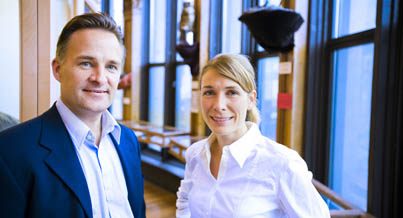T-PULSE at the heart of graduate teaching
T-PULSE at the heart of graduate teaching McGill University
User Tools (skip):
T-PULSE at the heart of graduate teaching

Grants officer, David Syncox and workshop coordinator Siara Isaac have their fingers on the T-PULSE.
So there you are, a new teacher, standing in front of your first class. Everything is going according to your meticulously laid-out lesson plan. You've just delivered a scintillating lecture and left yourself a good 30 minutes to moderate the debate you've no doubt inspired. Smiling, you ask a preliminary question to open the floodgates of discussion. Nothing but a sea of blank faces. The only sound? The deafening tick-tock of the clock marking your every second in New Prof Purgatory.
This uncomfortable scenario is all too common because many teaching assistants and new profs make the jump to the other side of the lectern with heads full of brilliant ideas but little practical knowledge of how to actually teach.
Enter the Tomlinson Project in University-Level Science Education, or T-PULSE. Established in 2002, as part of the landmark $64-million endowment to McGill from Canadian scientist and businessman Richard H. Tomlinson, T-PULSE is designed to develop effective teaching methods among students in the Faculty of Science. Twice a year, in August and January, T-PULSE coordinators hold a two-day graduate teaching workshop that introduces participants to teaching philosophies and arms them with practical strategies on how to be effective in the classroom.
"One of the keys to the workshops is that they are run by Teaching Fellows," says T-PULSE workshop coordinator Siara Isaac who also is working to submit her thesis in chemistry. "It is very much a mentoring system in which junior Fellows learn from the seniors." The Fellows present the 85 workshop participants—mostly students with an eye on becoming professors—with learner-centred approaches to teaching that can be easily applied in classrooms and science labs. As well, special topics will explore everything from grading to cultural differences in education.
While it may sound like a mandatory skill set for aspiring profs, the surprising fact of the matter is that there is a dearth of programs like this at McGill and across the country. "There is a grassroots fire happening underneath our feet," says T-PULSE's evangelical Grants Officer, David Syncox. "Because the University doesn't have this type of training, students from other faculties are pleading to be allowed to take the workshop."
In fact, word of the program's success has traveled beyond the Roddick Gates. Students from UQAM and Université de Montréal have asked for permission to attend the workshops because their schools offer no comparable programs. This past August, three guests from University of British Columbia's Department of Physics sat in on the workshop so they could bring the model back to the west coast and set up a similar program.
MITI comes out strong
The grassroots fire seems to be spreading; the Faculty of Agriculture and Environmental Sciences' first graduate teaching workshops were held this past August. Modeled after T-PULSE, Macdonald Innovations for Teaching Improvement (MITI) reached capacity enrollment and was judged "an absolute success," by Marcia Waterway, a professor in the Department of Plant Science and MITI's faculty coordinator. "The very last exercise had everyone go around and say what they will bring back to the classroom from the workshop and everyone had something very different to say. To me this is proof that the workshop works on many different levels and has something to offer everyone."
Waterway contends that the success of the program is due in large part to the workshop's structure. "It's peers teaching peers, with some of the more experienced graduate students sharing their knowledge and first-hand teaching experience with people who have never taught before," she says. While the first installment of MITI used the same T-PULSE Fellows, along with Tracy Eades, Associate Curator of the McGill Herbarium in the Plant Science Department, the long-term goal is to develop a wholly Mac-oriented workshop, designed for the specific needs of the Mac students and run by Fellows from the faculty.
For their part, Isaac and Syncox couldn't be happier with the T-PULSE spinoff. "Everyone benefits from this," says Isaac. "Within McGill, it makes for better TAs, which, in turn, can only help the undergraduates they teach. And when these people leave, they are taking with them the skills that will benefit their careers."
For more information about the T-PULSE program or to apply for the January workshop go to www.mcgill.ca/science/tpulse/. For more information about the MITI program or to apply for the January workshop go to webpages.mcgill.ca/staff/Group2/teades1/web.

